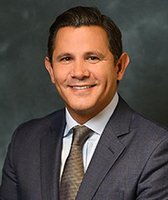Get PolitiFact in your inbox.
Several Democrats running for president said in the November debate that voter suppression was to blame for Stacey Abrams’ narrow loss in the Georgia governor’s race in 2018.
Sen. Cory Booker, D-N.J., said during the debate in Atlanta that "right here in this great state of Georgia, it was the voter suppression, particularly of African-American communities, that prevented us from having a Gov. Stacey Abrams right now."
Two of his opponents, Senators Bernie Sanders and Amy Klobuchar, mentioned voter suppression or purges as a factor.
"It is not just voter suppression which cost the Democratic Party a governorship here in this state, not just denying black people, people of color, the right to vote, but we also have a system through Citizens United, which allows billionaires to buy elections," Sanders said.
"I have led the way on voting, and I can tell you right now one solution that would make a huge difference in this state would be (to) allow every kid in the country to register to vote when they turn 18. If we had a system like this, and we did something about gerrymandering, and we stopped the voting purges, and we did something significant about making sure we don’t have money in politics from the outside, Stacey Abrams would be governor of this state right now," Klobuchar said.
We previously found it isn’t possible to prove if any election law or policy in Georgia cost Abrams her narrow loss to Republican Brian Kemp.
Abrams lost by almost 55,000 votes in a race with record turnout for a midterm race, said University of Georgia political scientist Charles S. Bullock. Black turnout in 2018 actually slightly exceeded that in 2016, he said.
"The claim is a good talking point, but the evidence is missing," he said.
Kemp made some controversial decisions that probably hurt Democrats overall, but it’s difficult to determine exactly how many people were prevented from voting, Daniel P. Tokaji, who teaches election law at Ohio State University, told PolitiFact.
"The only really honest answer is that no one knows for sure how much voting was depressed by the alleged acts of ‘voter suppression’ by former Secretary of State Kemp," he said.
RELATED STORY: Kamala Harris says voter suppression kept Stacey Abrams, Andrew Gillum out of office. Really?
Kemp has drawn scrutiny for the high number of voters removed from the voter rolls during his tenure because they skipped previous elections and had no contact with the election officials. By the end of 2017, about 670,000 people, or about 10 percent of voters, were removed from the rolls. Voting rights advocates raised alarms about the massive purge, while Kemp defended the responsibility of election officials to maintain voter rolls.
The state also flagged 53,000 registrations as part of a 2017 law that requires exact matches for a person based on state and Social Security records. The Associated Press found that the majority of those flagged voters were African-American. Mismatches occurred over differences as small as a missing hyphen. We can’t know how many eligible voters would have shown up and cast ballots for Abrams if they were not removed or were confused by the exact match law. Kemp argued that the process wasn’t discriminatory, because pending applicants could still vote if they produced a photo ID at the polls.
By blaming voter suppression for Abrams’ loss, Democrats ignore other factors in her uphill battle. She ran in a state where Republicans have dominated statewide races for decades while calling for more gun control, expanding health care and decriminalizing certain drug offenses. Her messages appealed to minorities and infrequent voters, but Kemp, who boasted that he could "round up criminal illegals" in his pickup truck, won more conservative parts of the state.
The focus on voter purges also omits that voter registration surged under Kemp amid automatic registration, outpacing population growth.
Skeptics of claims about voter suppression point out that Georgia had record turnout. FiveThirtyEight, a website that analyzes election statistics, found that an estimated 55% of eligible voters exercised their right to vote, about 21 points higher than the state’s 1982-2014 midterm average.
Our Sources
PolitiFact, Kamala Harris says voter suppression kept Stacey Abrams, Andrew Gillum out of office. Really? May 10, 2019
Email Interview, Charles Bullock, University of Georgia political science professor, Nov. 20, 2019


































